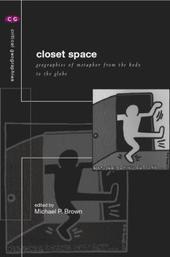
|
Closet Space: Geographies of Metaphor from the Body to the Globe
Paperback
Main Details
| Title |
Closet Space: Geographies of Metaphor from the Body to the Globe
|
| Authors and Contributors |
By (author) Michael P. Brown
|
| Series | Critical Geographies |
|---|
| Physical Properties |
| Format:Paperback | | Pages:192 | | Dimensions(mm): Height 234,Width 156 |
|
| Category/Genre | Literary studies - general |
|---|
| ISBN/Barcode |
9780415187657
|
| Classifications | Dewey:306 |
|---|
| Audience | | Undergraduate | | Postgraduate, Research & Scholarly | | Professional & Vocational | |
|---|
| Illustrations |
9 black & white tables
|
|
Publishing Details |
| Publisher |
Taylor & Francis Ltd
|
| Imprint |
Routledge
|
| Publication Date |
10 August 2000 |
| Publication Country |
United Kingdom
|
Description
Closet Geographies examines how the spatial metaphor of "the closet" works not merely metaphorically to describe the concealment, denial and ignorance of gay men's presence in the world, but also materially as a spatial practice of power/knowledge. It explores how our use of this metaphor draws on implicit assumptions about space and movement to argue that the closet can be found at a variety of spatial scales, from the body to the globe, and in numerous locations. By situating the closet in different locations and at different spatial scales, Brown shows how the closet's iterations has implications for a wide array of contemporary social theories and debates. Drawing on both qualitative and quantitative means, the author explores the closet through texts that include: the oral histories of gay men in the UK and the US, the sexualised landscape of a New Zealand city, the national census of Britain and the US, and international travel guides and travelogues. These multiple placements speak to/through Butler's theory of performativity, Lefebvre's urban theory, Foucault's notion of governmentality, and Lacan's arguments about desire. By tacking between metaphoric and material spaces and scales of the closet, and using a variety of research techniques and materials, this book provides a decidedly geographic extension of previous research on the closet, which has largely come from literary criticism and the humanities. While Closet Space augments the growing interest in sexuality and space specifically, its broad theoretical and empirical reach should interest scholars working in social theory more generally.
Reviews"Using the work of Butler, Foucault, Lacan, Sedgwick, Soja, and other contemporary social theorists, Brown weaves together a convincing tapestry of metaphor and performance to build a theory of closet spaces that undeniably demonstrates the power of the closet to shape gay and nongay geographies...."Closet Space is a necessary and welcomed addition to the growing body of geographic literature on the lives of gays and lesbians.."
-J. Dallas Dishman, "Economic Geography
|